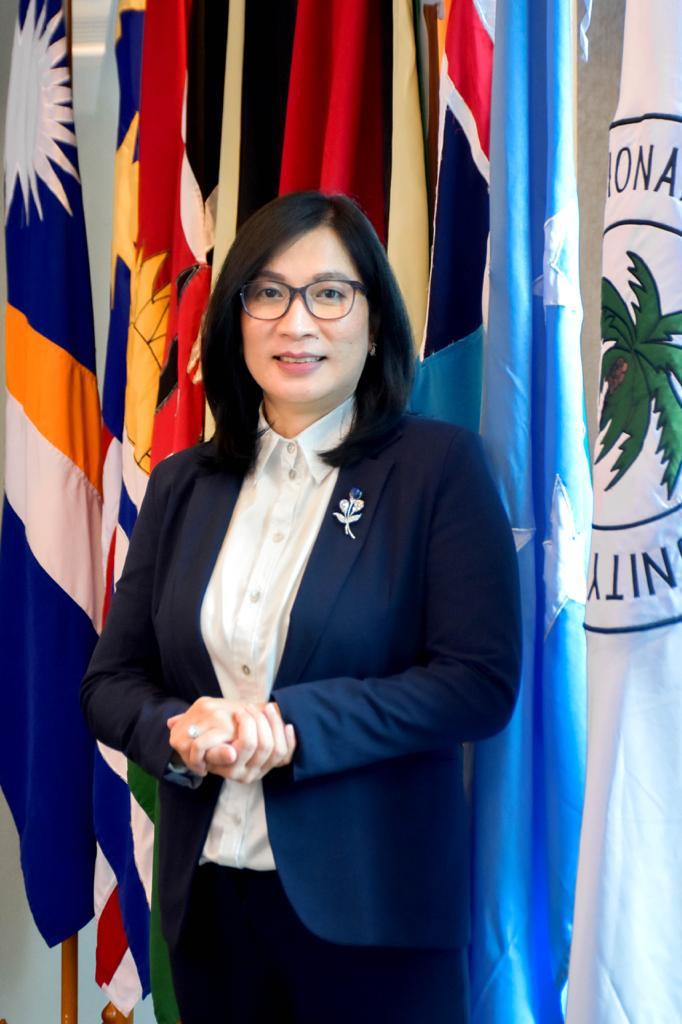- Home
- Executive Director
 Dr. Jelfina C. Alouw
Dr. Jelfina C. Alouw
She assumes charge over as Executive Director of the International Coconut Community, Jakarta, Indonesia since 2020. Prior to this appointment she was working as head of Collaboration and Dissemination Division of the Indonesian Division for Estate Crops Research and Development, Indonesia. She is an Entomologist by profession and with her 27 years of experience in the field of agriculture development, she is frequently providing technical assistance and consultancy for coconut development to farmers, coconut industries, students, lecturers and other governmental organizations. She is the author of many informative articles on coconut which were published in renowned international journals.
Speeches | December, 2025
Biochemical Resilience and Cultural Significance of Coconut Products in the Festive Season
The transition into the winter holiday season represents a period of significant metabolic and environmental transition for the human body. The holiday season brings three main challenges that make it hard for our bodies to stay healthy and balanced. First, the dietary landscape shifts toward high-calorie, lipid-heavy, and sugar-dense foods, which places an immense burden on metabolic regulation and insulin sensitivity. Second, the social nature of the holidays, combined with colder weather in temperate zones, forces individuals into confined indoor environments where exposure to seasonal respiratory pathogens increases. Finally, the external environment, characterized by plunging temperatures and low humidity, creates a state of dermatological strain, stripping the skin’s natural barrier of moisture and lipids. To combat these pressures, the coconut palm (Cocos nucifera) offers an array of functional derivatives. Products such as virgin coconut oil (VCO), coconut water, and coconut flour provide a unique biochemical toolkit that supports immunological defence and helps maintain physiological resilience during this demanding time of year.
At the heart of the coconut’s nutritional value is the structural complexity of its kernel. This kernel serves as a dense reservoir for proteins, functional dietary components, and a unique profile of lipids. A critical but often overlooked component of this architecture is the testa, the thin brown layer situated between the white meat and the hard shell. It is the primary site for the fruit's most potent nutraceuticals. The testa is concentrated with tocopherols, tocotrienols, and a variety of phenolic compounds that grant the coconut its superior antioxidant capacity. By retaining the testa in certain processing methods, the resulting products provide a much broader spectrum of protection against the oxidative stress typically induced by holiday overindulgence and environmental toxins.
For those navigating the metabolic demands of the holiday season, the choice of oil is paramount. The bioactive integrity of VCO, rich in lauric, caprylic, and capric acids, is prized for its rapid absorption, metabolic efficiency, and anti-inflammatory traits. These medium-chain fatty acids (MCFAs) support cellular energy without the heavy inflammatory load associated with highly processed lipids.
While these biochemical benefits are vital in colder climates, the coconut remains equally central to resilience and tradition in tropical countries. In regions like Southeast Asia, the Caribbean, and India, the coconut is not merely a supplement but a cornerstone of festive identity. During Christmas in the Philippines, the Buko Pandan salad—made from young coconut strips, is a staple of the Noche Buena feast, while in Manado, Indonesia, the holiday season is synonymous with Klapertart, a Dutch-influenced coconut custard. In these climates, coconut water serves as a vital natural electrolyte to combat heat-related fatigue during long communal celebrations. Furthermore, the fatty acid profile of coconut milk provides the necessary satiety and energy for traditional slow-cooked holiday dishes, such as Indonesian Rendang. In these contexts, the coconut transcends its biochemical utility, acting as a symbol of prosperity and a "natural coolant" that balances the internal body heat generated by spicy festive foods and tropical humidity.
Beyond the lipid content, the coconut matrix is rich in specific phenolic acids that serve as a defence mechanism for both the plant and the human consumer. These compounds work synergistically to neutralize free radicals, protecting the body's tissues from dermatological strain and metabolic exhaustion. Furthermore, the consumption of these products carries significant socio-economic weight. In countries like Indonesia, the Philippines, and the Pacific Islands, the holiday surge in demand for coconut-based treats provides a critical income spike for millions of smallholder farmers. As global demand for functional "holiday" foods grows, the regional economic stability of these nations is bolstered. By integrating coconut products into the festive diet, consumers support their own biological resilience while contributing to a global supply chain that sustains the livelihoods of farming communities. This intersection of biochemistry, culture, and economics highlights the coconut as a truly holistic resource for the festive period worldwide.
